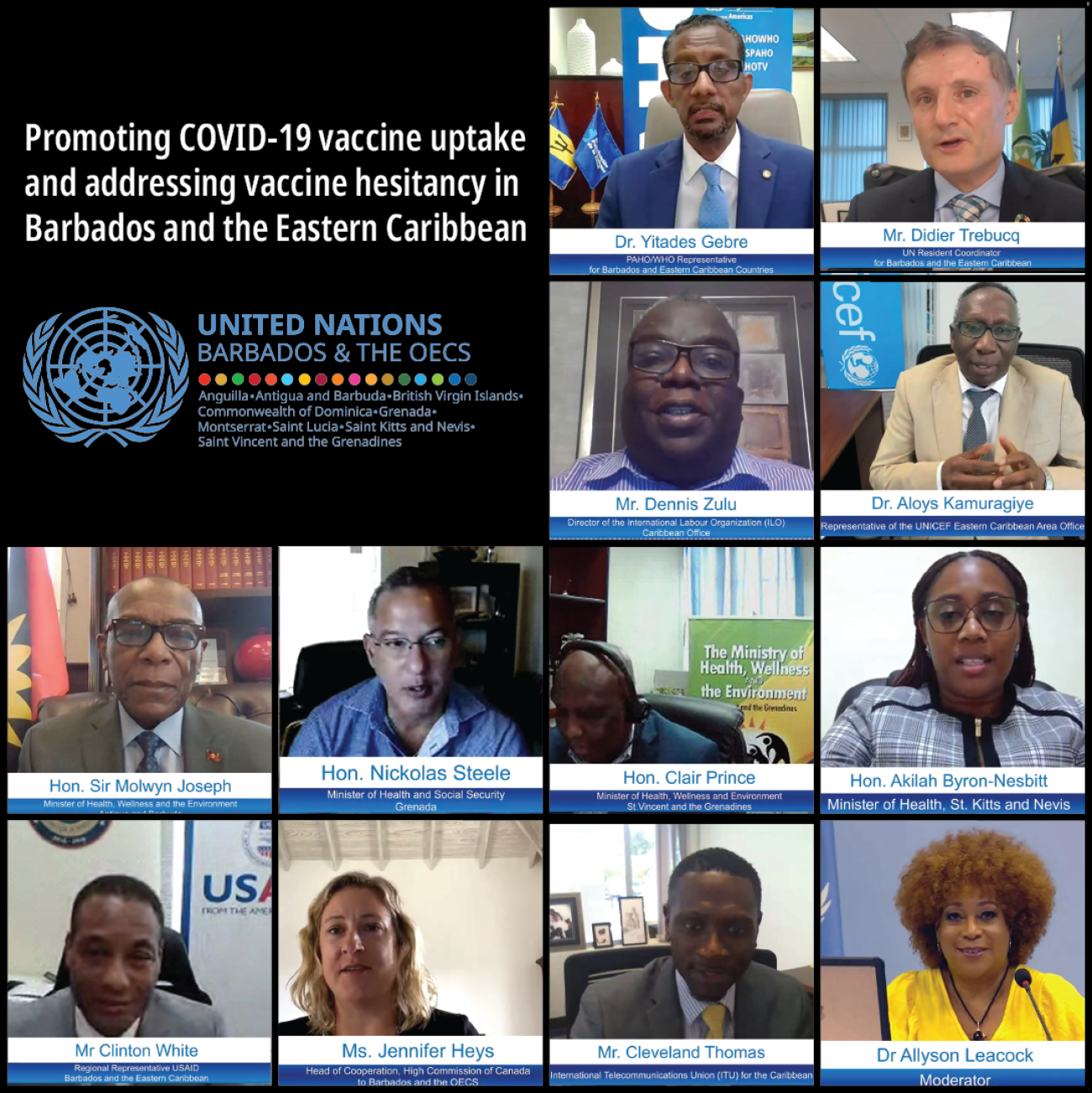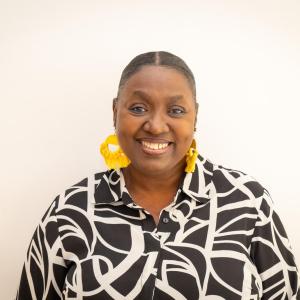Bridgetown.- As COVID-19 vaccine wastage, fueled by vaccine hesitancy, steadily mounts across the Caribbean Sub-region, the UN Barbados and Eastern Caribbean mission, in collaboration with regional authorities and development partners, have embarked on an initiative to boost uptake, counter misinformation and save lives.
An inter-agency proposal that aims to support the Eastern Caribbean countries and Overseas Territories was formally launched by the UN and is being implemented with the support of development partners, primarily USAID and Canada, who have committed financial resources to the endeavour.
Addressing the virtual ceremony, UN Resident Coordinator, Didier Trebucq highlighted the importance of vaccination as the pandemic is heavily impacting economies and societies, increasing debt and deepening existing inequalities. Noting that restrictions of movement through border controls, curfews, school closures and lockdown measures have come at a huge cost to the region with countries’ debt to GDP ratios increasing by 21 percentage points between 2019 and 2020, and currently exceeding 100% of national income in some instances.
The UN head urged other partners and donors to join the UN in this important undertaking. He cautioned:
“Partners and colleagues, the time for developing innovative strategies is now; if Caribbean SIDS are to restore their economies and have a fighting chance to get back on track the 2030 Agenda.”
The joint proposal brings together six UN Agencies – PAHO/WHO (acting as technical lead agency), UNICEF, UNDP, UN Women, ITU and ILO – who are partnering with regional Governments to address vaccine hesitance through policy advisory support; behavioural change strategies to complement ongoing communication and advocacy; addressing vaccine motivation; and strengthening vaccine rollout.
PAHO/WHO Representative, Dr. Yitades Gebre painted a picture of lagging vaccine rates in recent months that has resulted in more than 62,000 COVID-19 doses being discarded due to expiration dates. He called for a more holistic approach to combatting misinformation perpetuated via social media and online forums.
“In August 14,000 vaccines were unused, In September 38,200 doses were also wasted and in October 9,600, which is a rough estimate. There is both vaccine hesitancy and open vial wastage,” Dr. Gebre explained while revealing plans by the UN to strengthen vaccine delivery to minimize hesitancy, with a global coverage target of 70% by June 2022, with interim targets of 10% and 40% by September and December 2021 respectively.
Health Ministers from Saint Vincent and the Grenadines, Grenada, St. Kitts and Nevis and Antigua and Barbuda were also present to support the initiative, while giving first-hand reports of the COVID-19 situation in their countries.
Minister of Health, Wellness and the Environment for Saint Vincent and the Grenadines, St. Clair Prince, told the forum his Government had been navigating the impact of multiple crises - Dengue, COVID-19, and the eruption of La Soufriere volcano. Reporting evidence of vaccine effectiveness in reducing transmission, illness, and death, he strongly signaled his Government’s commitment to working to combat vaccine hesitancy.
“Our commitment is to continue to work on these key areas - research and policy, behavioural change strategies, risk communications and advocacy, vaccine rollout, vaccine monitoring and of course continuing to work with the UN and our partners to get vaccine hesitancy down in Saint Vincent and the Grenadines,” he assured.
Minister of Health and Social Security, Mr. Nikolas Steele, noted that at the start of the pandemic in early 2020 Grenada had a 98.5 percent vaccination rate on all of the other WHO approved and prescribed vaccines. He emphasized that what had changed was the messaging surrounding COVID, the public debates on vaccines and most definitely the rise of conspiracy theories. “But I think the most important aspect that we did underestimate was the power of social media and the fact that we have no control over it,” he maintained, alluding to the presence of “two parallel social media” realities, which are based in algorithms tied to search history.
Citing instances where unvaccinated persons were demonstrating, encouraging others not to be vaccinated, and persons who traditionally complied were becoming weary and tired of the sacrifices being made to help those who chose not to. This balance, the Health Minister warned, must be managed.
“As we move forward we need to find that ideal balance between carrot and stick to deal with the vaccination issue. There have been different reactions from the public, and time will tell which combination was the most effective. In Grenada , we choose to use more of education and less of legislation, and use legislation based on the risk levels of certain sectors, but there is no rule book.”
Minister Steele also underscored the need to ensure supply frequency and reliability of vaccines , that the vaccine debate to be restricted to only COVID-19 vaccines, and for the region to maintain vaccine certificate integrity.
Meanwhile, Sir Molwyn Joseph, Minister of Health , Wellness and the Environment of Antigua and Barbuda, stressed that Antigua had always felt it important to maintain the delicate balance between protection of lives and livelihoods, which has not been an easy balance.
“We have paid a high cost for our failure to really invest sufficiently in preventing the morbidities in our populations and allow the coronavirus to thrive,” he acknowledged admitting that enough may not have been done to educate the public on their role in public health.
Citing recent reports of 99 deaths at their national hospital, Sir Molwyn said of this figure, 95 persons were unvaccinated. “Yet with this alarming state of affairs with deaths and suffering we still have hesitancy, and this is why I welcome this dialogue and commend the UN and PAHO for facilitating[it],” he emphasized, noting that in Antigua they did not start off with mandates, but mandates only became necessary when they witnessed a rapid decline in the economy and an increase in deaths and suffering. Between September 30 when COVID-19 vaccine mandates were announced and November 17, Minister Molwyn said they had seen an uptake by 13,000 persons.
USAID Regional Representative, Mr. Clinton White told the forum that bolstering country readiness, with emphasis on addressing vaccine hesitancy and misinformation, is critical to getting vaccine doses into the people who need them.
To support these efforts , he explained: “as announced at the Global COVID-19 Summit USAID plans to provide an additional $195 million in American Rescue Plan Funds for vaccine readiness and delivery around the world, which builds on the almost $700 million USAID is programming in vaccine readiness and delivery to help countries around the world to strengthen their programmes and enhance equity.”
Head of Cooperation, Global Affairs Canada, Ms. Jennifer Heys also reiterated Canada’s commitment to a robust global effort to stop COVID-19 and address its devastating health, socio-economic and security impacts on people around the world. Emphasizing that the COVID-19 pandemic is a global threat that will only be overcome through coordinated global action she revealed: “To date, Canada has mobilized more than $2.5 billion in international assistance in response to the COVID‑19 pandemic globally. Over $1.3 billion in new funds has been committed to date to help ensure access to COVID-19 vaccines, tests and treatments for people around the world.”
UN representatives from UNICEF, ITU and ILO also provided insight on current approaches to counter vaccine hesitancy.
In delivering closing remarks while highlighting her country’s situation, Minister of Health St. Kitts and Nevis, Ms. Akilah Byron- Nesbitt, noted that unfortunately before the first COVID-19 vaccine could have been granted emergency use authorization, conspiracy theorists had already begun a huge anti-vax campaign with social media providing the platform for theories to spread globally, at a pace that made it difficult to counter effectively. By the time they as health officials were armed with the requisite scientific data, the Minister recalled that they were faced with the daunting task of convincing persons that vaccines in general were safe and effective, before they could even begin the conversation about the COVID-19 vaccines in.
“In St. Kitts and Nevis we have managed to convince 79.4 % of adults in our population (which is 57.1 % of total population) to be vaccinated with at least one dose and 72.9 % of our adult population (which works out to 52% of entire population) with at least a second dose by November 17.”
Minister Byron- Nesbitt recalled noting that compliance was achieved without mandates, and through a robust vaccination campaign that commenced in February this year.
The vaccine hesitancy proposal is costed at USD$3.1M ($3,182,000), with a funding gap of USD$2.3M ($2,346,388).
More information
MEDIA CONTACT:
Carol A. Gaskin
Development Coordination Officer, Programme Communications and Advocacy
Resident Coordinator Office
UN Barbados and the Eastern Caribbean
Tel: 1 (246) 832-6110; Email: carol-ann.gaskin@un.org





